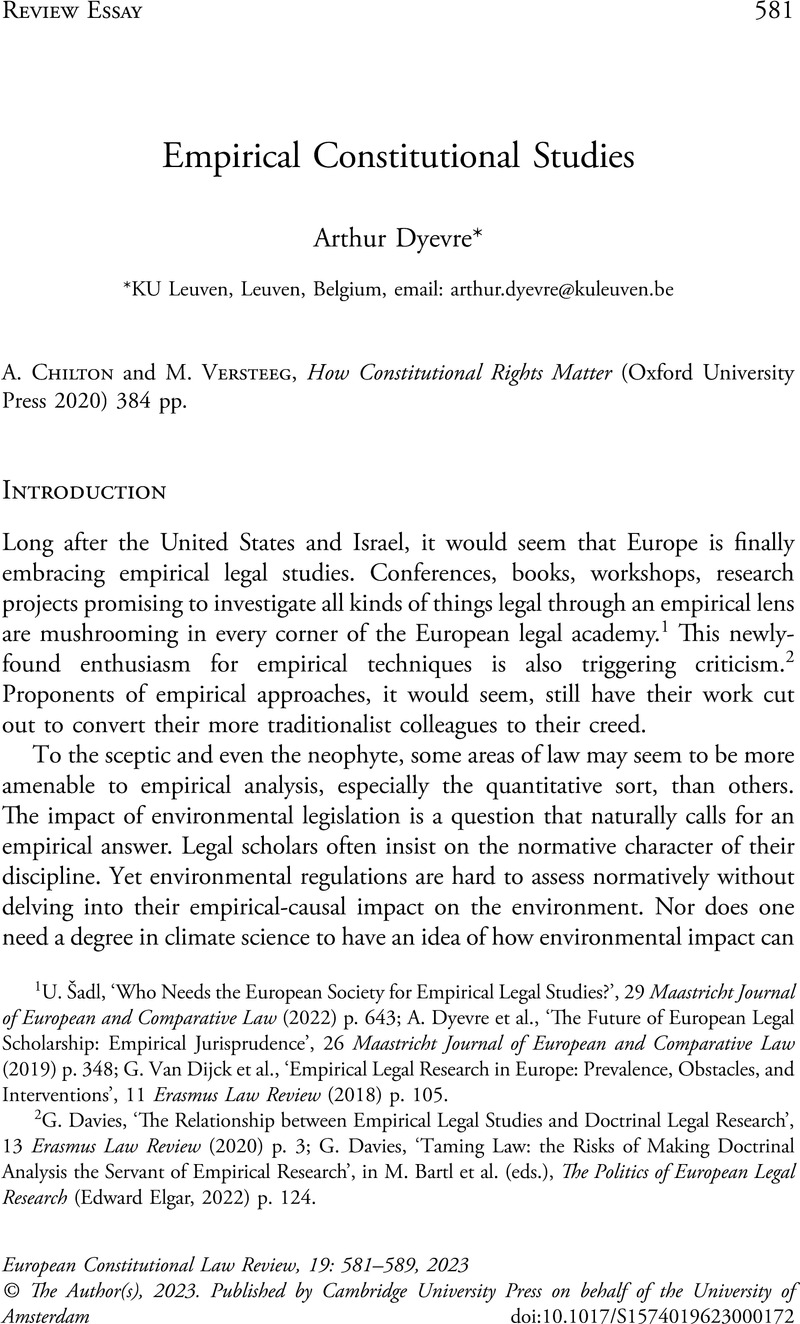No CrossRef data available.
Article contents
Empirical Constitutional Studies
Review products
Published online by Cambridge University Press: 25 September 2023
Abstract

- Type
- Review Essay
- Information
- Copyright
- © The Author(s), 2023. Published by Cambridge University Press on behalf of the University of Amsterdam
References
1 U. Šadl, ‘Who Needs the European Society for Empirical Legal Studies?’, 29 Maastricht Journal of European and Comparative Law (2022) p. 643; A. Dyevre et al., ‘The Future of European Legal Scholarship: Empirical Jurisprudence’, 26 Maastricht Journal of European and Comparative Law (2019) p. 348; G. Van Dijck et al., ‘Empirical Legal Research in Europe: Prevalence, Obstacles, and Interventions’, 11 Erasmus Law Review (2018) p. 105.
2 G. Davies, ‘The Relationship between Empirical Legal Studies and Doctrinal Legal Research’, 13 Erasmus Law Review (2020) p. 3; G. Davies, ‘Taming Law: the Risks of Making Doctrinal Analysis the Servant of Empirical Research’, in M. Bartl et al. (eds.), The Politics of European Legal Research (Edward Elgar, 2022) p. 124.
3 See the recent meta-analysis of S.J. Hoffman et al., ‘International Treaties Have Mostly Failed to Produce their Intended Effects’, 119 Proceedings of the National Academy of Sciences (2022) e2122854119.
4 A. Chilton and M. Versteeg, How Constitutional Rights Matter (Oxford University Press 2020).
5 Ibid., p. 226.
6 Ibid., p. 30.
7 Ibid., p. 31.
8 Ibid., p. 32.
9 C.R. Epp, The Rights Revolution: Lawyers, Activists, and Supreme Courts in Comparative Perspective (University of Chicago Press 1998).
10 Chilton and Versteeg, supra n. 4, p. 27.
11 Ibid., p. 53.
12 J.D. Angrist and J.-S. Pischke, ‘The Credibility Revolution in Empirical Economics: How Better Research Design is Taking the Con out of Econometrics’, 24 Journal of Economic Perspectives (2010) p. 3.
13 See the discussion in H. Spamann, ‘Empirical Comparative Law’, 11 Annual Review of Law and Social Science (2015) p. 131; and N. Petersen and K. Chatziathanasiou, ‘Empirical Research in Comparative Constitutional Law: The Cool Kid on the Block or All Smoke and Mirrors?’, 19 International Journal of Constitutional Law (2021) p. 1810.
14 Chilton and Versteeg, supra n. 4, p. 107.
15 Ibid., p. 53.
16 A.S. Chilton and M. Versteeg, ‘Courts’ Limited Ability to Protect Constitutional Rights’, 85 The University of Chicago Law Review (2018) p. 293.
17 Z. Elkins et al., The Endurance of National Constitutions (Cambridge University Press 2009).
18 D.S. Law and M. Versteeg, ‘The Evolution and Ideology of Global Constitutionalism’, 99 California Law Review (2011) p. 1163; T. Ginsburg and M. Versteeg, ‘Why Do Countries Adopt Constitutional Review?’, 30(3) Journal of Law, Economics, and Organization (2013) p. 587; Spamann, supra n. 13; Petersen and Chatziathanasiou, supra n. 13.




